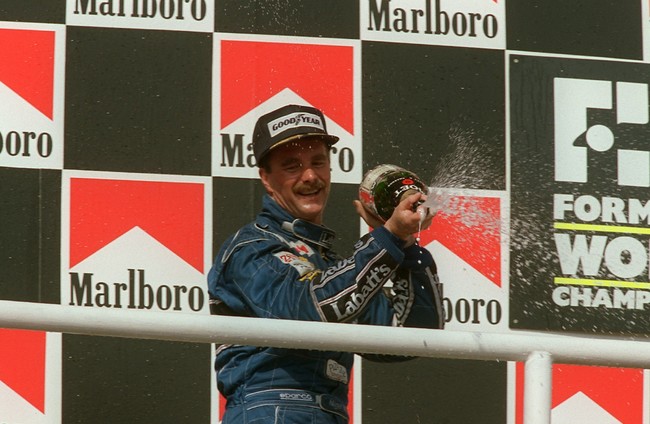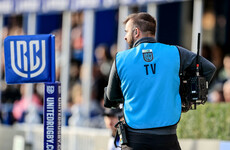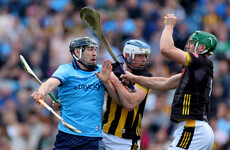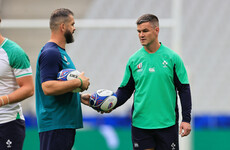THE FOLLOWING PASSAGE is an extract from Nigel Mansell’s ‘Staying on Track’.
Most people get opportunities in life. Sadly, some people are guilty of not seizing those moments. Life is about grasping the opportunities that come your way, taking that chance and running with it. Some people think they will have more opportunities further down the line, so this one particular moment is not that important but, of course, they are often wrong. You have to embrace it now. When you get a moment – like the one I felt I had in 1992 – it is gold dust.
Going into 1992 I was my lightest, fittest, most focused – I was ready to embrace the opportunity. I felt I had paid my dues, with all those years in inferior cars or as a number two driver. I’d surpassed the great Sir Stirling Moss for grand prix wins; I was closing in on Jim Clark and Jackie Stewart’s tallies; but above all I wanted the world title. Senna and McLaren were likely favourites, Ferrari were always hovering around, and Benetton-Ford were also a force to be reckoned with.
The FW14B was a brilliant car, refined in the wind tunnel, and an improvement even on the brilliant car of 1991. It also had a more reliable active suspension system, which underwent over 7000 hours of testing. The electronics guy at Williams even called his experience of one particularly gruelling test at Estoril as ‘The Eight Days War’, because it was so intense and focused. The resulting car was over two seconds faster than the preceding passive car. It was also proving to be reliable. Now I was really excited.
I dominated the first race at Kyalami, winning by 24 seconds from Patrese, and nearly 35 seconds ahead of Ayrton. As I’ve said, I won the first five grands prix in a row, also scooping pole at the first six races. A loose wheel nut scuppered me in Monaco (destiny again!), but generally I was feeling fantastic. I sensed that I was almost unstoppable.
The fourth grand prix of the year was in Catalunya in Spain and it was very challenging. One aspect that yesteryear and modern drivers share is terrible visibility when it rains. I remember some dreadful conditions for a few stand-out races in my career, weather that really tests your skills and nerve. The tropical storm we raced in at Adelaide in ’91 was shocking.
I think Monaco, when I crashed out in the lead, was shocking too – and very disappointing because I was leading on Casino Square. The monsoon race in 1994 in Japan was another incredible one – boy, that was unbelievable. Those are the three races that I can distinctly remember being severely challenging because of the weather.
It is no exaggeration – if it rains when you are driving a Formula 1 car, you really can’t see much at all; it is very dangerous. The biggest problem when you have a really heavy downpour is not so much the rain; it is when you aquaplane. Wet-weather tyres work very well, so normally you do retain grip. However, if you then aquaplane your car goes from having some sort of grip and control to zero grip and zero control – you are a complete passenger. Aquaplaning is like being on ice.
You just slide straight away and once it starts, until the car gets some grip again or adhesion to the circuit, you just speed up all the time, so it actually magnifies; it gets worse before it gets better. I can’t say hand on heart that you enjoy those races; you survive those races.
I won quite a few races in the wet. I think the outstanding race I had in the rain was when Michael Schumacher was in his Benetton-Ford catching me a few seconds a lap at Barcelona in 1992. I couldn’t figure out why he was catching me so quickly. I managed to catch a glimpse of him in my mirrors and I realised that he was taking totally different lines, in the process almost losing control of his car on the outside of the circuit at times, searching out these different lines.
I thought, Well, I had 15 seconds on him, now it’s down to five. I’ve gotta push now, but surely he can’t sustain this? However, he did. So I started to push. I almost lost the car on a couple of corners – it slid out to the edge of the circuit and I thought I was going off, and then all of a sudden there was so much more grip out there!
From having a few whoopsies, I then changed my line quite significantly and went two to three seconds a lap quicker myself. Then I even started to pull away from Michael. I didn’t get any credit for it; the press said I was playing with him. What a load of nonsense – he was driving fantastically. I had to relearn real quick where he had the advantage.
Fortunately, I was able then to find the time and to go on to win the race. That was one of the best wins I had that season, because I felt extreme pressure from this young guy coming from nowhere and catching me quite quickly, and I was thinking, I am going pretty flat out here – what am I doing wrong? He’d found better grip in the corners and until I worked that out he was catching me. That shows you what a brilliant, intuitive racer Michael was and for those reasons I am very proud of that victory.
I’d heard from Frank as early as Mexico back in March that Alain Prost might be a new team-mate for the next season. With my experiences of Prost at Ferrari this was not a prospect I was particularly enamoured with. I told Frank my opinion in no uncertain terms, making it clear that I was not happy about this possibility. Not happy at all.
At the time, I didn’t allow these conversations about Prost to distract me from my mission. In Spain, I won my 25th grand prix, equalling Jim Clark’s record, a very proud moment indeed. By winning the next race in Imola, I became the first driver ever to win the first five races of a season, another record.
I would win nine times that season, securing 14 pole positions out of 16 races in the process. Quite quickly, Senna was trailing me heavily in the points and he was pushing hard, not least during a very controversial incident when, in my opinion, he took me out of the race in Canada as I tried to pass him. He didn’t agree with my view, of course, but I was not a happy chap about that one!
At the end of every single race in 1992, I basically went into a dark room and virtually cried because of the pain I was in from my broken foot. I did get hammered by certain elements of the press, who said I was overdramatising, which was ludicrous. I was driving with a broken foot! It was annoying at the time, of course, but looking back now I would only say that they had no idea of the physical demands of driving a car all year with an injury like that.
I raced the entire year with that broken foot, and had no surgery until after the season had ended. I put that down to a dogged determination because I knew I was about to have the opportunity to win at the highest possible level and get to the top step of the World Championship.
Like I said, those opportunities don’t come along that often – embrace them. Remember, I had already been the bridesmaid three times before and I had been number two driver for three world champions – Piquet, Rosberg and Prost. I had smelt it and almost tasted it for so many years but never got there. However, in 1992 I really felt like this was my time. My window of opportunity was there and I was not going to let anything get in the way, not even broken bones.
I won another British Grand Prix that year and with the growing sense that I could be on my way to the title, it was a special weekend. I was extremely focused, very quick all weekend, and scooped pole position, fastest lap (in fact, 11 fastest laps) and another Silverstone win. And, yes, it is true that Ayrton Senna was stopped by police for speeding in his Porsche on the M25 and they asked him, ‘Who do you think you are? Nigel Mansell?’
After my Silverstone win, fans poured on to the track and it was just the most euphoric moment. It also meant that I had secured my 28th grand prix win, which was the most for any British driver in F1 history, finally surpassing Sir Jackie Stewart. I was just so proud. The crowd reaction was spontaneous; it was really wonderful, a fantastic day. Apart from running over a couple of people’s toes . . .
By the time I reached Hungary, there were several permutations that would mean I’d lift the world title, but there was really only one that mattered: I was one win away from the title that I had craved for so many years (in fact, second place would do). It was not a circuit famous for overtaking opportunities, so it was by no means a simple task. Nonetheless, I was just 77 laps from being world Formula 1 champion.
You should have guessed by now that lifting the title in Hungary was never going to be straightforward! The circuit was ridiculously dusty and on the Friday I had a fire in the engine bay. I also got caught up in someone else’s accident but eventually landed safely on the grid in second, behind Patrese.
I slipped from second to fourth at the start, with Patrese, Senna and Berger ahead of me. After passing Gerhard and Riccardo, who slipped down to seventh after a mistake, I was in the second place I needed for the title. That’s when I got a slow puncture . . . Blimey, what do I have to do to win this title?
The pit stop was executed brilliantly by the team – the whole Williams team had been tremendous all year – but it still dropped me down to sixth with 16 laps to go. Then Schumacher retired in fifth with wing damage, and I got past Häkkinen then Brundle, and after talking to Patrick on the radio to confirm the position I needed – still second – I took Berger and settled into the slot that would give me the world title with 13 laps left.
This time there were no crashes, no tyre blow-outs, and I made it to the finish line in second, behind Ayrton, to take the title. Crossing the line as Formula 1 world champion was just the most incredible feeling. I had done it! Finally, after all the years, the battles, the sacrifices, everything that Rosanne and I had gone through, I was the world champion. I just felt total disbelief. I had done it.
I was world champion with five races of the season still remaining – Britain’s first F1 champion for 16 years. I’d totalled 108 points, 52 ahead of my second-placed team-mate Riccardo Patrese. I’d recorded an unprecedented five opening wins, the most pole positions in one season with 14, the most fastest laps, the most points, the most wins with nine and a new British record total of 30 grand prix wins at that point. It was total domination, to be fair. I had finally done it.
On the podium, Ayrton was very nice to me and at one point he leaned over to me and whispered into my ear: ‘Well done, Nigel. It’s such a good feeling, isn’t it? Now you know why I’m so difficult sometimes. I don’t ever want to lose the feeling or share it with anybody else.’
I’ve mentioned already how I am a huge fan of Sir Stirling Moss. He’s a lovely man and Susie, his wife, is wonderful too. After my World Championship win, I bumped into him and he was so generous and funny. Remember, this living legend is a man who was bridesmaid four times and, if you recall, back in Estoril he’d thanked me for surpassing his number of grand prix wins without being world champion.
When I saw him that day after winning the title, I playfully said, ‘Stirling,’ – he was not yet ‘Sir’ – ‘I believe I previously took your record for winning the most races without being crowned champion. Well, it gives me great pleasure to now hand that accolade back to you.’
He leaned towards me with a delightful smile on his lips and said, ‘You bastard.’
Winning the F1 World Championship was wonderful, it really was. The Williams team did a magnificent job that season with a fabulous car – my favourite, you might not be surprised to hear! – and I was totally dominant all year, so I am very proud of my achievement. It was the completion of one part of my life and dreams, and it felt especially good because I had been so close on all those previous occasions. Numbness, happiness, elation, so many emotions. I wish my mom and dad had been there to see me step up on that podium as world champion, I really do.
The days immediately after winning the world title were incredible, fabulous, a joy. I had finally done what I set out to achieve all those years ago. I was the champion. It felt so good! We had a belated birthday party for Chloe, and Murray Walker came over to the Isle of Man to do a BBC special about my championship season.
However, at the same time, my drive for 1993 with Williams was still not secure. The mid-season talk about Prost had not been welcome. The negotiation challenges I faced after I won the World Championship have been well documented, not least in previous books. To summarise what happened: I believed I had agreed a provisional deal to drive for Williams in 1993 but, as the season ran on, a formal agreement was seemingly delayed. Then it became apparent that Ayrton Senna was possibly in the mix for a drive, which really unsettled me. There was even talk of him offering to drive for free, while my critics were very negative about the money being speculated upon in my deal.
Even though Prost would be the other Williams driver, I was excited about the possibility and the privilege of being able to defend my world title and of building on the enormous success we had all enjoyed at Williams in 1991 and 1992. However, we couldn’t seem to find a way to reach an agreement. Obviously, I had my view and Williams had theirs. Unbeknown to me, the relationship with the French sponsors was quite significant to Williams’ future.
Bernie Ecclestone was fantastic as usual and tried to do all he could to help resolve the issues. He was always a great supporter of mine and wanted me to stay in F1, but even when I ultimately chose to race in the USA he told me that, if that was my decision, then I should at least go out there and win. Sadly, the situation with Williams could not be resolved and so destiny decreed that I would not be racing for Frank’s team and defend- ing my world title in 1993.
At Monza, I called a press conference where I announced my retirement, even though a Williams representative made last-minute attempts to dissuade me. My lengthy statement attempted to explain why I was retiring from the sport of which I was world champion. ‘Due to circumstances beyond my control . . . I have made this decision with some regret, but not without a great deal of thought.’ I explained my position and that since the saga started ‘relations with the team have not been good’.
I acknowledged it was Frank’s prerogative to choose his drivers for his team but stated that I still felt very disappointed. I finished by thanking Williams and Renault for their support to date and wished them well for 1993. I also suggested I may look to America for my next racing challenge.
I’m not going to repeat myself here but suffice to say I felt incredibly deflated, dejected and very disappointed that I wouldn’t be defending the title I was so incredibly proud of.
I was criticised by some for leaving F1, while Williams were also criticised by certain parts of the media and public alike, with some even demonstrating outside the factory, but in a statement they said they felt ‘deep regret’ that I had chosen to retire and I had a ‘special place’ in their team’s history. They also said I ‘richly deserved’ the title but pointed out, as was their prerogative, that they felt they had to preserve the wellbeing of the team. So, as I’ve said, destiny decided that I wouldn’t be blessed with the opportunity to defend my F1 World Championship.
I have a very healthy respect for Sir Frank and certainly what he has achieved in Formula 1 is absolutely remarkable. Obviously, as with many relationships, we had some disagreements in our time working together, which I have touched on here. Clearly, when I thought his decisions were not in my best interests, then we had strong differences of opinion.
Conversely, Sir Frank always said he had to put the interests of his team first. The Williams team is one of the finest in Formula 1 and I am extremely proud to have been a part of that history. I think, after his accident, to go and win the constructors’ title in the same season typifies the bulldog spirit and culture of excellence that Sir Frank creates in his team.
There were still races left in the 1992 season. After announcing my retirement, hydraulic failure curtailed my race at Monza, albeit only after setting the fastest lap. I won the next race in Estoril, a record ninth win that was overshadowed by my team-mate Riccardo Patrese’s awful accident when his car went airborne, which thankfully he emerged from unscathed.
Riccardo finished second in the championship and Williams won the constructors’ title. It was a hugely dominant performance from the whole team all year. Unfortunately, after Estoril I had two retirements for my last brace of races for Williams, in Suzuka and Adelaide. The first was an engine fault, the second was an accident, when Ayrton’s car hit me from behind and took us both off.
So, despite being the reigning F1 world champion, I retired from Formula 1. The day after my title season ended, I came back home and was admitted to hospital for the operation on my long-suffering foot. I was on crutches for three months and recuperated in time for the new motorsport season, which, as destiny had decreed, would not be in Formula 1. As you know me by now, you perhaps won’t be surprised to learn that, for all the considerable disappointment of not defending my F1 world title, I would immediately bounce back, across the Atlantic, in what some people considered was the fastest and at times the most dangerous motorsport of all: IndyCar. Exciting times ahead!
Nigel Mansell’s ‘Staying on Track’ is published by Simon & Schuster. More info here.














Paul, whats the code for the fantasy football league?